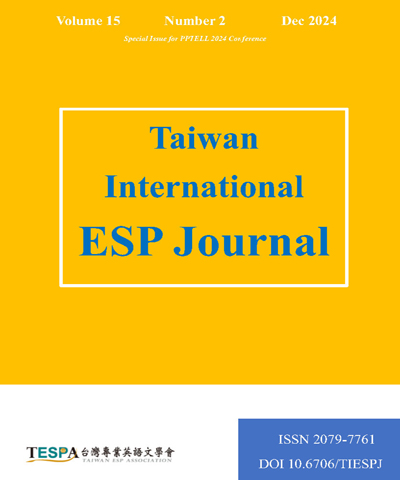
Taiwan International ESP Journal/台灣專業英語文期刊
- OpenAccess
台灣專業英語文學會,正常發行
選擇卷期
- 期刊
- OpenAccess
Gamification and game-based applications (apps) have been widely applied in education and have shown positive results. Nevertheless, empirical studies examining the use of game-based mobile applications (GBMAs) in medical vocabulary learning are scarce. Additionally, although the importance of ESP vocabulary has been emphasized, little is known about how mobile devices could be applied in ESP vocabulary learning. The researchers of the study developed a GBMA, OTouch, for learning medical academic vocabulary and investigated how 30 learners from a College of Medicine in Taiwan improved their medical academic vocabulary after using the app, and their attitudes towards it. Multiple sources of data were collected to investigate how OTouch affected their vocabulary learning, including a pre-test, post-test and delayed post-test on the medical academic vocabulary, two questionnaires, and follow-up interviews. Results showed that OTouch brought learning gains in medical academic vocabulary, and the learners generally had positive attitudes toward the use of mobile devices for learning ESP vocabulary.
- 期刊
- OpenAccess
This discussion examines the full texts of a corpus of 250 medical research articles (MRAs) published in English between 2001-2011 in order to identify changes in or additions to the moves specified in the earlier framework identified in 1997 by Nwogu. That time span was chosen to reflect the rapid growth in and greatly increased pressure on non-native English medical personnel across the world publishing in English in international journals. Examining frameworks for genre analysis can help teachers develop ways for student writers to transfer knowledge and skills to new contexts of academic or professional writing. The study grew out of earlier research by Davis (2015) which examines moves and associated steps throughout this MRA corpus, using Swales' socio-rhetorical framework for genre analysis (Swales, 1990, 2004). It hopes to contribute to studies of practices in types of medical writing across the field and range of specialties of medicine, the analysis of which can be used by writing instructors, editors, and material and course developers.
- 期刊
- OpenAccess
This article presents the course design of teaching apologetic emails for specific purposes using a genre-based approach implemented in a rural EFL junior high school classroom. The study explored the learners' perceptions of the teaching and the benefits gained from the genre-based instruction. The instruments included the learners' email scripts from a written discourse completion task (WDCT) as the pre- and post-tests, in-class group work email tasks, retrospective verbal reports (RVRs), learning journals, and a perception questionnaire of learning reflection. The course design was depicted in detail according to the four stages: setting the context, modelling, joint construction, and independent construction. Results indicated that learners exhibited positive attitudes towards the instruction, and expressed their learning preferences for email construction and learning difficulties in adopting apology strategies. On the other hand, the findings not only showed the learners' improvement in apologetic email writing, but further demonstrated their increased pragmalinguistic awareness. This report concluded with pedagogical implications for teaching email pragmatics in the era of English as a lingua franca (ELF).

